Project Management for Marketing Teams

- Summary
- What Is Marketing Project Management?
- Key Reasons Marketing Project Management Tools Are No-Brainers for a Marketing Team
- What Does a Project Manager Actually Do?
- So Is Project Management for Marketing Teams Different From Regular Project Management?
- Use Cases That Prove Marketing Project Management Software Is a Good Choice for Marketing Teams
- The Project Management Process Marketing Teams Can Use to Maximize Efficiency
- 4 Project Management Methodologies (Frameworks) That Work
- 4 Tips for Successful Project Management
- How Can You Build a Productive Project Team?
- Best Marketing Project Management Software for Marketing Teams
- Getting the Most Out of Marketing Project Management Software
- Before you leave
Is project management for marketing teams worth all the fuss? Considering that project management software users are 4.26x more likely to report success than non-users, we’ll have to say it is.
What Is Marketing Project Management?
Marketing project management involves the journey of executing a marketing campaign, from planning all the way to final delivery.
Think of it this way: you have a marketing goal to achieve. Marketing project management is where you lay out all the steps involved in achieving that goal, the timeframe for each step involved, who’s working on what, the tools for the task, and how to get the job done.
Project management tools are popular among marketers as they give a bird's-eye view of a project and its moving parts. But that’s not all there is to it.
Take Deezer for example. They increased customer engagement by 483% in just weeks.
Here’s what happened. The teams at Deezer were managing projects through Google Suite, Google Sheets, to be precise. But as the projects grew more complex, it was evident that they needed a platform where they could collaborate more efficiently and track project progress.
That’s when they turned to project management tools. After adopting a project management tool, they witnessed an instant change in operations. Suddenly, there was more transparency, efficiency, and improvement in collaboration. Creating more fluid workflows and managing projects more efficiently increased their user engagement by almost 500%.
So, is project management worth the fuss? Absolutely.
But, if you’ve been in the project management space for a while, you'll know it's not that easy. The several moving parts in project management can quickly overwhelm you.
We've created this guide to help you better understand the project management landscape, so you can manage future marketing projects smoothly. Think of it as your project management goldmine. The best part? It's all in plain English—no unnecessary jargon here. Let's dig in.
Key Reasons Marketing Project Management Tools Are No-Brainers for a Marketing Team
Every marketing team has different elements, personalities, and skills. These different parts are cross-functional, meaning they work hand in hand to complete any marketing project. Without a project management software, you can easily lose track of those vital components in your marketing team.

Instead of having a well-oiled machine, you’ll be left confused and still have a deadline you have to meet. This brings us to our first point on why marketing teams need project management software.
1. Coordination and Organization
If you lay out your marketing plans, you’ll realize there’s an endless list of things to do. Project management software gives you a clear picture of your project’s scope and what tasks need to be done in specific timeframes.
This way, you can keep track of tasks and project timelines without confusion. You also get insights into upcoming tasks and plan when to get them done.
2. Collaboration
Communication is a crucial element in any marketing project. You have project managers, executives, salespeople, and creatives all involved in the process. They must collaborate to produce the final deliverable, and this collaboration largely relies on effective communication.
You can’t rely on emails for a collaboration of this scale. It doesn’t allow you to build fluid workflows for task allocation and approvals. That’s why the best project management tools have team collaboration features to streamline the process. You can also use communication channels like Slack for this.
3. Productivity
Project management tools eliminate confusion and show your team upcoming tasks and project timelines to work on. This means no more wasting time trying to figure out your next steps. These tools even have calendars and notifications to keep everyone on track.
4. Transparency
A project management tool allows you to track project progress and monitor your marketing processes efficiently. Project management features like Kanban boards help keep all relevant stakeholders in the loop so everyone’s updated on any changes and the progress of each marketing department.
It also helps spot potential bottlenecks in your marketing strategy before they surface in implementation. This transparency helps you maximize the performance of your marketing campaigns and minimize time wasted in the process of getting others up to speed.
5. Marketing Resource Management
With a good marketing project management solution, you can manage all your marketing processes, workflows, and content from one central database. This reduces repetitive tasks and gives you time to focus on other essential marketing campaign elements.
In the initial stages, these functions can appear overwhelming, but with the help of a project manager, you’ll see how streamlined project management increases your productivity as a team and keep clients in the loop.
What Does a Project Manager Actually Do?
There's no straightforward answer to this question as a project manager's responsibilities depend on the project and several other factors. However, Keith Brooks, project manager for marketing teams with 20+ years of experience, says:
"Most people don't get to pick their approach. It gets dictated by execs, IT funding, etc. In fact, the tools, processes, and purposes are different, so it's only logical that the responsibilities will differ too."

While every digital marketing project manager may have different roles, certain constants cut across. Every marketing project manager has these responsibilities:
Establishing Project Objectives and Process
Every marketing project needs a process and an endgame. If someone wants to market a product, what results does the person want to see? More subscribers? Increased awareness? How do you move from “I want to market my product“ to “This marketing campaign has been successful!“?
The marketing project manager is responsible for setting the objectives and goals for any marketing campaign. Of course, they do this with the help of the stakeholders involved. They also develop a plan that takes the marketing campaign from an idea to a deliverable.
Organizing the Teams Involved in the Project
If you take a step back, you’ll see that every marketing campaign is just one giant ball of smaller, cross-functional tasks. There are writers, content strategists, designers, salespeople, and customers all involved.
The project manager (PM) ensures these people do their jobs and are on schedule. The PM also functions as a coordinator for all communication to ensure everybody is on the same page.
Overseeing a Content Calendar
Today, every marketing strategy revolves around content. The PM creates a system for all this content and ensures the content is ready to roll out in tandem with the project schedule.
Setting Timelines for Milestones
The overall marketing campaign can be broad. For instance, if you want to gain visibility for a website, you can think of SEO, paid ads, social media campaigns, guest blogging, and other digital marketing strategies.
The PM breaks these pillar tasks into task lists and milestones, making them easier to complete. Then the PM sets project timelines for all these milestones and organizes the people involved to work within those timelines.
Hosting Kickoff Meetings and Check-Ins
Some marketing campaigns require several briefings and meetings, so the people involved know what’s what. The PM organizes these meetings and briefs people on the tasks, timeline, and expected project progression.
The PM is also responsible for keeping everyone on their toes. One way to do that is through regular check-ins (this can be a short chat or 1-1 meetings) to monitor the progress of project milestones.
Sending Project Progress Reports to Stakeholders
Once the PM knows the status of a project, they prepare a project progress report to keep stakeholders updated on the project’s lifecycle.
Ensuring Quality for Stakeholder Satisfaction
While the stakeholders set the standards for every marketing effort, it’s on the PM to uphold those standards when tasks are delivered.
So Is Project Management for Marketing Teams Different From Regular Project Management?
There’s a slight difference between managing marketing projects and regular projects (like a study project). Marketing projects are more expansive and complex. Of course, it also involves the usual processes (researching, setting campaign objectives, finding the right content marketing strategy), but you’ll find that marketing project management is more audience-focused.
The research involved, for instance, will look something like this:
-
Finding industry hot topics and trends
-
Defining the audience and creating segments
-
Developing buyer personas
Because of this complexity, it’s common to find marketing projects run by distributed teams. This makes project management even more vital—you need to coordinate the activities of all these teams.
Extend your team and reduce burnout with an outsourced project manager from O8
Use Cases That Prove Marketing Project Management Software Is a Good Choice for Marketing Teams
There’s nothing wrong with running your project with a fire-aim approach-nothing wrong subjectively, that is. But project management makes your marketing team more efficient. There’s no excuse for being among the 11.4 percent of teams that waste resources due to substandard or no project management systems.
If you’re still sitting on the fence about marketing project management software, here are a few cases that warrant a deeper look.
When Your Work Involves a Collaborative Unit
You have a goal for your project, great. It’s now up to all the different working parts to collaborate and make something out of that goal—the team communication side of things. You can try controlling everything through different channels, but you’ll wear out soon enough.
If only there were a way to run everything from a central point. Well, there is - that is a project management tool. With a project management tool, you can work with freelancers, contractors, or anybody at all, anywhere in the world, without friction.
When You Have Limited Resources
Let’s face it. Sometimes, the budget just doesn’t cut it. You need to micromanage things if you’re going to finish your project. Enter marketing project management software.
With these tools, you can define what goes where. But it’s not only about the money; you must allocate everybody’s time to get work done on schedule. You can’t do that when you have no overarching control over your project.
When You’re Learning About Your Niche and Formulating Strategies on the Go
If you’re in marketing, you know there are no hard and fast rules. In fact, what worked yesterday may not come close to a solution today. In this case, you need data to make informed decisions.
With a project management tool, you can get data from past projects and compare it to newer ones. You can finally get answers to questions like:
-
What worked?
-
What could we improve on?
-
What can we cut off to be more efficient?
Even if your past projects are on another platform, maybe on a spreadsheet, marketing project management tools have integrations that allow you to migrate data from an external source to their platform.
It’s hard to make a case against these tools. The project management process makes everything even simpler.
The Project Management Process Marketing Teams Can Use to Maximize Efficiency
The project management process is slightly different for every project. But on a basic level, there are six stages in every marketing project management. These are:
-
The objective setting stage
-
The strategy stage
-
The organization stage
-
The execution stage
-
The monitoring stage
-
The reviewing stage
The Objective Stage
At the objective stage, you have an idea. Now you need an endgame. This is where you ask yourself, “What do I want to achieve by the end of this project?” or “What are the success metrics for this marketing campaign?“ If you can find answers to these questions, you’re ready for the next stage.
The Strategy Stage
It’s time to think about actions. Here, you’ll be conducting market research, evaluating competitor content, identifying trends, etc.
This is also where you find your target audience and the message you want to extend to them. After all, your audience won’t take action if your message doesn’t resonate with them. Determine your messaging, and establish your call-to-action (CTA).
Next, evaluate the project and determine your deliverables. This is anything that you have to produce to aid the marketing process. For example, blog posts, infographics, ads, etc.
This is essentially where you establish your marketing project plan. Get it right, and you’ll be smiling when you launch your campaign.
The Organization Stage
You have your goal, your expected outcome, and your message. Now, you need to organize the pieces in between to get the ball rolling.
You’ll have different people working on various deliverables, maybe in different places. You must coordinate their activities with rigorous task management processes. For instance, you’ll have to assign the subtasks, allocate labor hours, and ensure everyone knows the due dates. There’s also file sharing and whatnot to think about.
A typical organization stage dashboard looks like this:
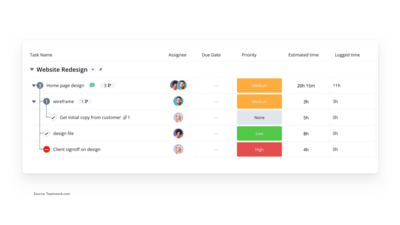
Most project managers create project schedules for better work management. This gives the whole project some form of chronology - like this:
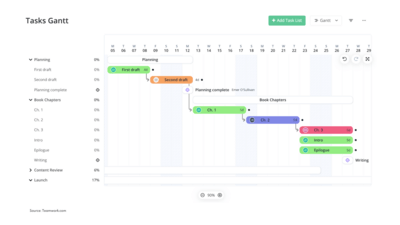
The Execution Stage
This is where the bus starts moving. At this stage, you can expect activities like time tracking, real-time subtask creation, project progress tracking, user interaction with the marketing campaign, etc.
Marketing project management tools help you optimize the processes in this stage with features like Kanban boards. Kanban boards are the go-to visualization style for many marketing teams because they give users a scannable view of a marketing project. Here’s an example:
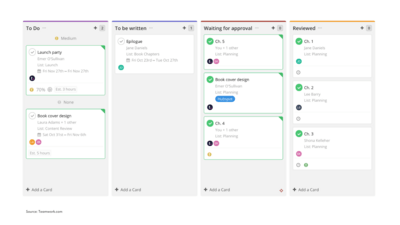
It’s true that only 42 percent of team members understand what other members are working on, even when they see it on the board. However, visualization like this gives a sense of direction to your project.
The Monitoring Stage
We’re back to your endgame and success metrics. Is your marketing campaign hitting the mark? One way to know is by monitoring your project's key performance indicators (KPIs). A project manager can help with that.
The Reviewing Stage
As mentioned earlier, a marketing project management platform gives you hard data you can use to improve your marketing campaigns. For instance, you can see how each marketing department is performing, so you know how to go about resource allocation in the future. You can also efficiently gauge the profitability of your campaign, so you know if it’s worth trying again.
If you can efficiently combine this process with a framework that works for your business, you’ll knock your project management out of the park.
Explore How to Choose the Right CMS in 2022
4 Project Management Methodologies (Frameworks) That Work
There are several project management methodologies out there, but they all boil down to four main ones:
-
Agile methodology
-
Waterfall methodology
-
Scrum methodology
-
Kanban methodology
We’ll briefly describe these frameworks so you can decide which one works best for your project.
Agile Methodology
Agile methodology is where team members work in short "sprints," which usually last 2 to 4 weeks. The agile method works best when you're running an in-house team, but it should equally work for distributed teams.
You can learn everything there is to know about Agile from the Agile Manifesto, but if you don't have the time, here's how it works.
The project manager collates the tasks to be completed in a sprint, then holds a sprint planning meeting (Asana has a project template for that) to determine the tasks to handle in the sprints. This way, everybody knows what to do in the next two-four weeks. After the sprints, the agile teams then hold a sprint retrospective to evaluate the sprints.
This illustration captures the method well:
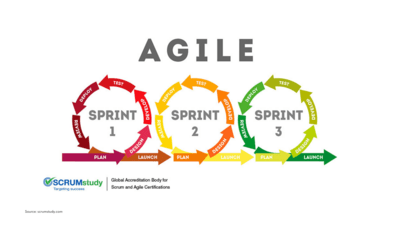
The Agile Methodology Is Best For
-
Projects that can change easily.
-
Projects where the outcome isn’t set in stone.
-
Projects where the client wants to be a part of the process.
-
Projects that require results quickly.
The Waterfall Methodology
This method breaks down the project into sequences or milestones, accomplishing one before the other—hence the name.
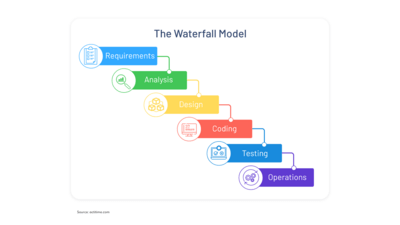
As with a waterfall, there’s no going back with this method. This makes it a dicey option for several marketing agencies and marketers, as you need an airtight plan before getting in. There’s little to no room for error. However, this method is effective for specific projects.
The Waterfall Methodology Is Best For
-
Projects with a well-established goal and plan.
-
Projects have predictable sequences.
-
Projects that have a regulated environment.
The Scrum Methodology
Scrum was a dedicated framework for software development teams when it first emerged. Not any more. Here’s how it works.
There’s a Scrum master assigned to monitor the three phases in a scrum: sprint planning, daily scrum standups, and sprint retrospective.
The scrum master organizes the content backlog and determines the tasks to be completed in the scrum. The Scrum master then conducts 15-minute meetings daily to check the progress of the tasks and what changes can be made. Finally, the master holds a retrospective meeting to discuss the completed tasks and next steps.
Even though it looks the same, there’s a difference between the agile and scrum methods. The one difference is that the scrum method doesn’t involve creating marketing deliverables, shipping them off, and never turning to them again. The agile method does.
Best For projects that require continuous improvement.
The Kanban Methodology
As explained earlier, Kanban gives team members a bird's-eye view of a marketing project. It involves stages of work that create a fluid workflow for team members. When marketers talk about the kanban methodology, they're referring to the Kanban boards and how they help structure their work.
Best For visual representation of project progress.
You can try each method to find the most suitable one for your projects. Combine that with your project management, and you’ll see leaps in your team’s productivity. But don’t go running off yet. Let’s see how you can use project management tools to their full potential.
4 Tips for Successful Project Management
Want to run your projects more efficiently? Implement these tips into your project management and see what happens:
1. Involve Your Marketing Team in Your Project Planning
You can come up with a compelling plan in place, but you’re not the one going to do the grunt. Your team members will be the frontrunners of your marketing campaign. That’s why it’s best to include them when planning the project. They’ll give you realistic timelines and budgets to work with, so you can run the project without friction.
2. Maintain a Content Backlog
It’s great to have brainstorming sessions - they give you ideas, so you can plan your marketing strategy. However, you can’t deny that some of your best ideas come when you’re on the go.
Instead of letting these ideas fly by, you can create a backlog (a paste your idea and move on center) to document them for future reference. It doesn’t have to stop with you. You can share this backlog with your team members so they can also contribute. This way, you’re never short of content.
The best part? You save time to handle more critical tasks in your project.
3. Cut the Spreadsheet Apps and Email
If you’re still using spreadsheet apps and emails, you need a second look at your marketing stack. Marketing projects require everyone in your marketing team to be in sync. That’s not possible with spreadsheet apps and email. Their management features and collaboration tools are lacking, they may have little to no automation or customizability - there’s really no argument here.
It’s best to use a marketing project management software like Asana, Monday, or Jira to optimize your marketing processes. They make it easier to track information, docs, timesheets, invoices, the whole nine. Marketing project management software simply offers a better workspace than any spreadsheet or email app ever could.
4. Create a Template Library
Marketing projects involve several repetitive tasks that can be avoided with templates. Instead of creating the same workflows for multiple projects, build a template to streamline the future marketing processes.
These templates can even act as the foundation for your marketing projects. First, create a skeleton workflow to serve as the baseline for all your undertakings; then, you can flesh it out with specific marketing project details to streamline your marketing processes and workflows. It’s handy when you need to get products going as early as possible.
Truthfully, every project manager worth their dime has templates they work with. Get one and make your work easier.
How Can You Build a Productive Project Team?
The type of team you build is dependent on several factors. That’s why we explain the building blocks of a great marketing team in detail. You can read it for a more in-depth understanding of the foundations of a productive marketing project team.
In the meantime, these tips will help you build a marketing team that wins.
-
Recruit team members from different departments for your project.
-
Look out for prospects who are eager to learn new things.
-
Choose a project manager who understands the project.
-
Establish clear goals and expectations before onboarding prospective team members.
One thing to understand is that your team will grow with time if you’re doing your business right, that is. This means you need to choose a scalable marketing project management software.
Best Marketing Project Management Software for Marketing Teams
We reviewed the most used project management tools among marketing teams, and these tools made our list of the best software on the market. We hope this list helps you make an informed decision for your marketing project.
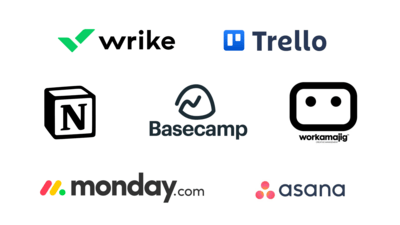
These tools are in no particular order.
Monday.com
Pricing:
Individual - Free forever plan for up to 2 users
Basic - $8/month per user
Standard - $10/month per user
Pro - $16/month per user
Contact Monday.com for enterprise-grade pricing
Top Features:
-
Dashboards
-
Integrations
-
Automation
-
Gantt charts
-
Kanban board
-
Docs
-
File sharing
Rating:
Trust Radius: 8.6 out of 10 (2,599 reviews)
G2: 4.7 out of 5 (6,204 reviews)
Software Advice: 4.58 out of 5 (2,703 reviews)
Trello
Pricing:
Free - $0 for a whole team
Standard - $5/month per user
Premium - $10/month per user
Enterprise - $17.5/month per user
Top Features:
-
Dashboard
-
Views
-
Automation
-
Integration
-
Powerups
-
Templates
Rating:
Trust Radius: 8.3 out of 10 (2,331 reviews)
G2: 4.4 out of 10 (12,822 reviews)
Software Advice: 4.5 out of 5 (21,285 reviews)
Workamajig
Pricing:
5-9 team members: $50/month per user
10-19 team members: $38/month per user
20-59 team members: $36/month per user
50-99 team members: $34/month per user
100-1000+ team members: Contact Workamajig for enterprise-grade pricing
Top Features:
-
Vendor management
-
Task management
-
Resource management
-
Sales CRM
-
Business intelligence
-
Invoicing
-
Budget planning
Rating:
Trust Radius: 7.2 out of 10 (28 reviews)
G2: 3.6 out of 5 (195 reviews)
Software Advice: 3.7 out of 5 (292 reviews)
Wrike
Pricing:
Free - $0/month per user
Professional - $9.8/month per user
Business - $24.8/month per user
Enterprise: Contact Wrike for enterprise-grade pricing.
Top Features:
-
Gantt Charts
-
Kanban boards
-
Templates
-
Visual proofing
-
Digital publishing
-
Shared team calendars
-
Project portfolio management
-
Time tracking
-
Invoicing software
-
Advanced analytics
Rating:
Trust Radius: 8.5 out of 10 (593 reviews)
G2: 4.2 out of 5 (2,652 reviews)
Software Advice: 4.3 out of 10 (1,794 reviews)
Asana
Pricing:
Basic - $0 forever
Premium - $10.99/month per user
Business - $24.99/month per user
Enterprise - Contact Asana for enterprise-grade pricing.
Top Features:
-
Workflow builder
-
App integrations
-
Automation
-
Gantt chart
-
Reporting
-
Boards
-
Calendar
-
Forms
-
Mobile Apps
Rating:
Trust Radius: 8.5 out of 10 (2,046 reviews)
G2: 4.3 out of 5 (8,844 reviews)
Software Advice: 4.5 out of 5(11,367 reviews)
Basecamp
Pricing:
Personal - Free for up to 20 users
Business - $99/month for any number of users
Top Features:
-
Message boards
-
To-do list
-
Docs and files
-
Automatic check-ins
-
Scheduling
Rating:
Trust Radius: 8.4 out of 10 (1,179 reviews)
G2: 4.1 out of 5 (5,056 reviews)
Software Advice: 4.3 out of 5 (13,623 reviews)
Notion
Pricing:
Personal - Free for individuals
Personal Pro - $4/month with unlimited guests
Team - $8/month per user
Enterprise - Contact Notion for enterprise-grade pricing.
Top Features:
-
App integrations
-
Migration tools
-
Automation
-
Gantt charts
-
Kanban boards
-
Templates
Rating:
Trust Radius: 8.9 out of 10 (292 reviews)
G2: 4.6 out of 5 (758 reviews)
Software Advice: 4.8 out of 5 (752 reviews)
Getting the Most Out of Marketing Project Management Software
It’s possible you can have a robust marketing project management software and have no idea what to do with it. That’s when most people go, “I don’t think project management tools are with it“, “Oh, these are just glorified spreadsheets“, or any other slamming comments people make about project management tools.
Here’s how to set up your marketing project management software for maximum impact:
-
Use the project documentation feature to record the critical details of your project.

-
Develop a project plan and map it out in your project management tool using Roadmaps.
-
Build a workflow for your processes.
-
The rest depends on your style and the demands of your project.
-
Add team members.
-
Use features like time tracking and customizable statuses to streamline your marketing processes.
-
Automate your repetitive tasks so you can complete projects faster.
The rest depends on your style and the demands of your project.
Before you leave
You can't ignore project management tools if you want to manage your projects more efficiently. They give your marketing team a structured system to work with. This is important, especially if you run a medium to large-scale marketing team.
Hopefully, you're now the expert on project management for marketing teams. If you're still feeling uncomfortable about handling your own projects, we recommend hiring an experienced project manager to do the work for you.
We hope this guide has taught you enough about project management. For more information or a first hand opinion from an O8 Project manager, get in touch.

